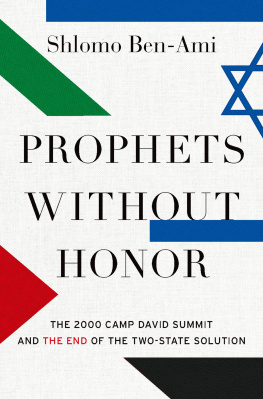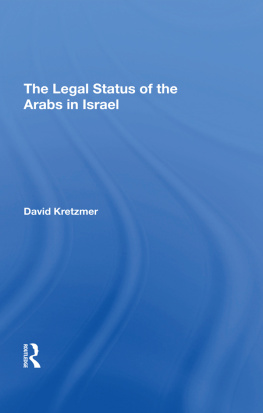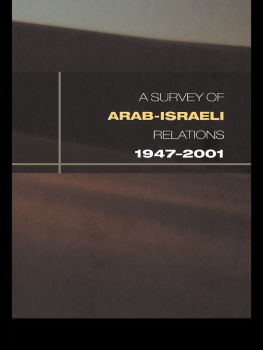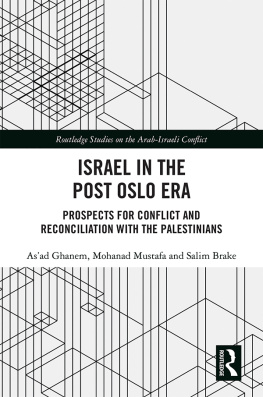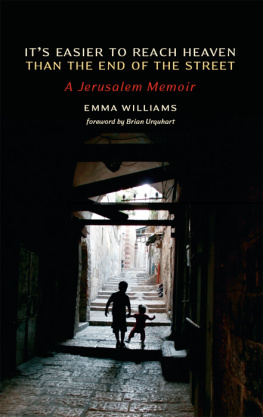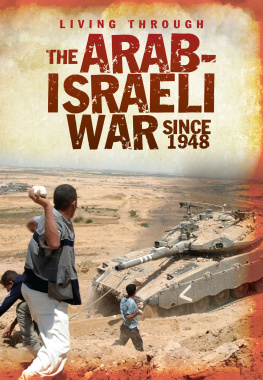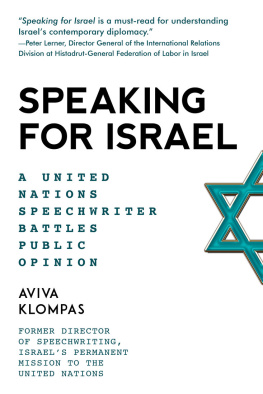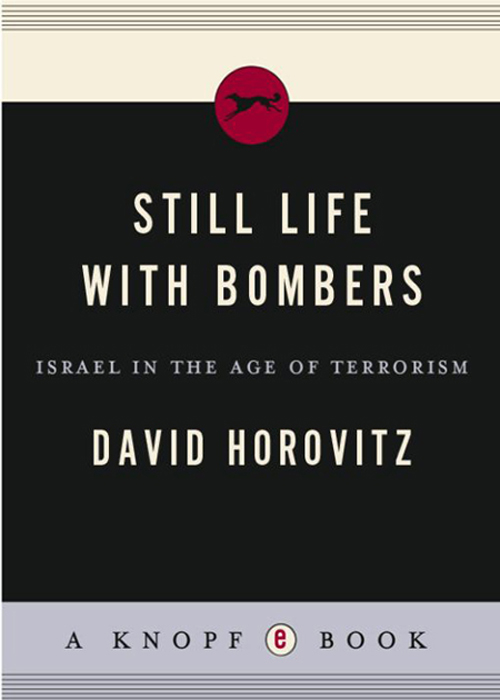
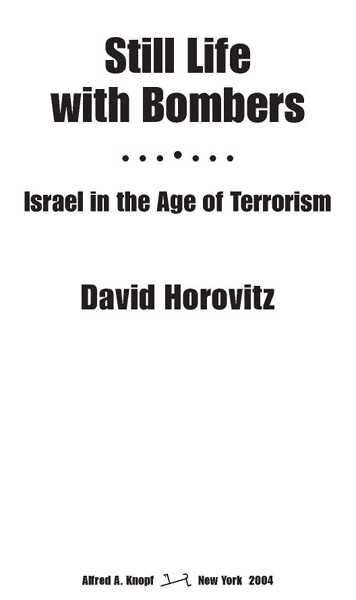
Table of Contents
For Lisa, Josh, Adam and Kayla
Pray for the peace of Jerusalem;
Those who love you shall prosper.
Peace be within your walls...
Psalm 122
Things to do today:
Get Up
Survive
Go to Bed
refrigerator magnet sold at Magnetron,
Downtown Disney, Orlando, Florida
Preface
Early in the sunny afternoon of September 19, 2002, a young Palestinian man boarded a crowded bus in the center of Tel Aviv and detonated the explosive device he was carrying. Yoni Jesner, a nineteen-year-old from Glasgow, Scotland, was one of the six innocent victims of the crime. Yonis family agreed to donate his organs, and one of his kidneys was transplanted into the body of a seven-year-old Arab girl, Yasmin Abu Ramila.
Yoni had been studying at a yeshiva south of Jerusalem and planned to stay on for another year. He then intended to head to London, where he would take up his deferred place at medical school. After qualifying, he wanted to build his life in Israel as a doctor. On the day those plans were blown away, he had been on his way to see his uncle, who was on vacation at a Tel Aviv hotel.
Three months later, a colleague of mine at work, Adi Covitz, also originally from Scotland, showed me an e-mail she had received. Headed Yonis Words of Wisdom for Life, it was a transcript of two pages in Yonis handwriting that had been found on his body. Written for himself, as a kind of personal behavioral code, some of these thoughts are simply straightforward and sensible: Sleep before a test or exam. Always buy presents at least one week in advance. Some of them are the sweet thoughts of a nineteen-year-old: Dont wear your trousers too high up. Dont slag off [put down] past girlfriends in front of prospective ones very off-putting. And some of them are wise and gracious: Dont make out that something is very obvious, or people will be scared to ask questions. Dont be scared to get up and dance. Youll get the hang of it. I know I wasnt making lists like that when I was his age.
Three days after he was killed, Yonis eldest brother, Ari, twenty-six, convened a press conference at a small downstairs room in the Davids Citadel Hotel in Jerusalem. A lawyer living in London, Ari, short-haired, with an unobtrusive black skullcap, wearing glasses and a MARYLAND FOOTBALL T-shirt, spoke calmly and firmly, in Hebrew and in English, about the death of his brother and the way it had struck his familyhis emotional turmoil betrayed only, perhaps, by the exaggerated emphasis he placed on some of his words and the way two fingers of each hand pressed down hard on either side of a microphone stand on the table in front of him.
Yoni was torn from us at such a young age, Ari began. He had a lot of plans for the future, but he had already achieved much in his short life, and touched and influenced many.
We are torn apart as a family, hugely shocked, Ari continued. It will take a long time before the events of the past few days sink in and we can start to grasp what happened.
Ari said he and Yoni had never discussed the possibility of his being killed, but it had certainly crossed my mind, as it does everyones in the state of Israel, living with the threat of suicide bombers.... But you have to go about your daily life and hope these things arent going to happen. Ari said that he himself had studied in Israel for two years and noted that, far from deterring his family from maintaining a connection to Israel, Yonis death had strengthened their resolve to move here. The fact that we decided that Yoni should be buried in Jerusalem connects us even more deeply to Israel. Yoni would have wanted to stay here and be buried here. A lot of Israelis dont realize, Ari added, that although many of us live abroad, we regard Israel as our home.
When Ari had answered a handful of questions from the twenty or so journalists crammed into the stuffy room, and the press conference was over, he came over to meto my surprise, as wed never met previously and told me he appreciated the columns that I write in The JerusalemReport, articles that, after the second Intifada erupted in September 2000, were largely devoted to my thoughts on the conflict: the causes, blame, solutions, the futile, relentless bloodshed. Ari said that my thinking largely reflected his own and that of his family, that I wrote the kinds of things he would want to if that was what he did for a living. He said he would be happy and interested to talk to me more about his brother and about his brothers death if I wanted.
I thanked him, tried uselessly to find some words to console him, wished him well and left. But then I went back into the room and asked Ari if I could take him up on his offer. And we tentatively arranged to meet again, which we did.
I believe in the power of the written word, and clearly Ari does, too. My encounter with him deepened my determination to write a book that could offer a sense of what it was like to live through this new-millennial round of the ancient Middle Eastern conflict, why we were plunged into it, how it was understood and misunderstood.
I have focused on the two and a half years from the Camp David summit in July 2000, when we appeared to be on the brink of a permanent Israeli-Palestinian peace treaty, to the overwhelming January 2003 election victory of Ariel Sharon and his Likud party, a ballot-box testament to Israeli despair and disillusion. It was a period of confrontation more bloody and relentlesss than any I had lived through. Seven hundred Israelis died. So, too, did almost two thousand Palestinians, many of whom were also innocent victims. The Middle East is never stagnant, and many aspects of our reality changed after that. Too many did not: The Palestinian mainstream still refused to legitimize a Jewish Israel and to concertedly confront the violent extremists who continued to bomb us. I feel sadly confident that the hostility I detail is no aberration, no final vicious flexing before our conflict is resolved. Nothing would give me more pleasure than to be wrong.
I dont claim to have many answers. Im not even sure Im asking the right questions. But Im trying to do in my way what everybody needs to do in theirs if people like Yoni Jesner, with their lives ahead of them and goodness in their hearts, are to stop dying before their time.
From 1997 to late 1999, I wrote another book, A Little Too Close to God:The Thrills and Panic of a Life in Israel. Though not short on bitterness, pessimism and tales of violent conflict, it was, I think, fundamentally optimisticcertainly with regard to the prospects for peace in the Middle East. I completed it just about the last time I was feeling seriously hopeful, during a brief (illusory) moment when it seemed that, after years of deadlock, the then-imminent election of Ehud Barak as Israels prime minister might possibly reopen the door to dialogue with the Palestinians and, perhaps, a permanent peace accord, to be followed, perhaps again, by accords normalizing our relations with other hitherto implacable foes in the neighborhood. The book was published in May 2000, coinciding with Baraks landslide election victory over Benjamin Netanyahu, a juncture when such optimism was relatively widespread in Israel, among those who cared in the United States and outside our region, and among some Palestinians, Syrians and moderate Arabs elsewhere. My relative optimism was swiftly overtaken by events: After the failure of the July Camp David summit, hosted by President Clinton, between Barak and Yasser Arafat, and in the wake of a controversial visit to the Temple Mount by the then Israeli opposition leader, Ariel Sharon, that September, the second Intifada erupted, and raged on through weeks, then months, then years.
Next page

